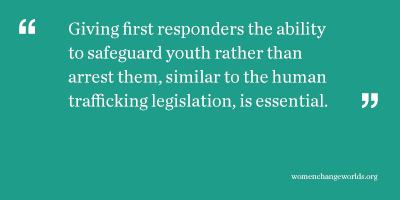This blog post, by Kathy Schleyer, was entered in the Wheelock College Policy Connection 2013 Student Blogger Contest and earned second place. The original post can be found on the Wheelock College Blog.
It happens to be a snowy day in March and I sit in the comfort of my warm (relatively) house in the suburbs of Boston. I am a middle-aged graduate student at Wheelock College studying contemporary issues of children and families. One of our assignments is to research and report on a personal topic of interest. Professionally, I am the Director of Training at the National Institute on Out-of-School Time (NIOST) at the Wellesley Centers for Women. I could write extensively on the importance of afterschool for children and youth, but today I must write on another topic.
 A few years ago my daughter, while in college in Connecticut, invited me to a community gathering she helped organize on human trafficking. The purpose of the meeting was to raise awareness of the topic and to encourage attendees to take action to help support young women who are lured or forced into a captive life of servitude or sexual exploitation. The impetus nationwide is to provide supports for the women to decriminalize their actions and to find, prosecute, and penalize the "johns" and pimps. At the time Massachusetts was one of three states without human trafficking legislation.
A few years ago my daughter, while in college in Connecticut, invited me to a community gathering she helped organize on human trafficking. The purpose of the meeting was to raise awareness of the topic and to encourage attendees to take action to help support young women who are lured or forced into a captive life of servitude or sexual exploitation. The impetus nationwide is to provide supports for the women to decriminalize their actions and to find, prosecute, and penalize the "johns" and pimps. At the time Massachusetts was one of three states without human trafficking legislation.
Today, Massachusetts has legislation in place against human trafficking but it is time to enact new legislation to protect a particularly vulnerable group of young adults who can fall prey to those who would enslave them into a life of sexual exploitation. These youth are called "unaccompanied homeless youth" and are defined as 1) under the age of 25 and 2) not in the physical custody or care of a parent or legal guardian and 3) lacking fixed, regular, and adequate housing. My intent is to draw attention to the importance of passing legislation to support unaccompanied homeless youth to them help avoid mental trauma, dropping out of school, living on the street, or becoming victims of human tracking. The multiple risks faced by homeless youth trying to survive on their own demand solutions that encompass stable housing, access to mental health services, job and skill development, etc. Therefore, legislation or state funding through line item budgeting is needed to enable these wraparound services.
First we must find these young people. An anecdotal phrase that describes one survival mode is "couch surfing." This term refers to youth that move from house to house seeking temporary refuge with help from relatives, friends or strangers. Others live on the street trying to survive by work (hard to get) or petty crime, selling drugs, trading sex for food or money or get caught up in the ravages of prostitution and illegal activities. The Massachusetts Department of Elementary and Secondary Education (MA DESE) estimates that there are approximately 6,000 high school students unaccompanied and homeless. This figure does not include those who have already dropped out of school or older youth aged out of the school system.
A classmate of mine "adopted" a homeless high school senior when her son brought him home one day saying that he had nowhere to live. He stayed for the remainder of the school year and enlisted in the U.S. Army upon graduation. This boy is fortunate- care came to him, but it is estimated by the Commission on Unaccompanied Homeless Youth that 50 high school students were homeless in the same town as this boy that year. It is unlikely many of those adolescents were as lucky.
I am grateful for my warm house and my family. I am so far removed from the experience of homelessness that it is hard for me to picture the day-to-day suffering of those affected. I donate money and I volunteer at a downtown shelter, but that is easy and I always go home to my own bed. Some reports describe the effects of street life as mirroring post-traumatic stress syndrome. We can look to nonprofits and churches to assist but it is time to act legislatively. We have the means to offer help and support through our public institutions and through our policing response. The human trafficking legislation passed in Massachusetts to protect vulnerable children, such as homeless youth, from sexual exploitation is proof of that fact. Giving first responders the ability to safeguard youth rather than arrest them, similar to the human trafficking legislation, is essential. Massachusetts has taken steps in this direction but it must go further with legislation and/or budgeting specifically directed towards unaccompanied homeless youth. I urge you to support the work of the Massachusetts Unaccompanied Homeless Youth Commission in addressing this issue. Visit the Massachusetts Coalition for the Homeless for more information and steps you can take.
Reference: Homelessness in Massachusetts Public Schools. From http://www.mahomeless.org/images/2011_data_8-12.pdf
Kathy Schleyer is an Educational Studies graduate student at Wheelock College (degree expected December 2013), and the Director of Training at the National Institute on Out-of-School Time (NIOST). She works to support the professional development of afterschool staff. Her primary focus is on the use of assessment tools to improve program quality and to help youth reach positive outcomes.
When you subscribe to the blog, we will send you an e-mail when there are new updates on the site so you wouldn't miss them.
Comments